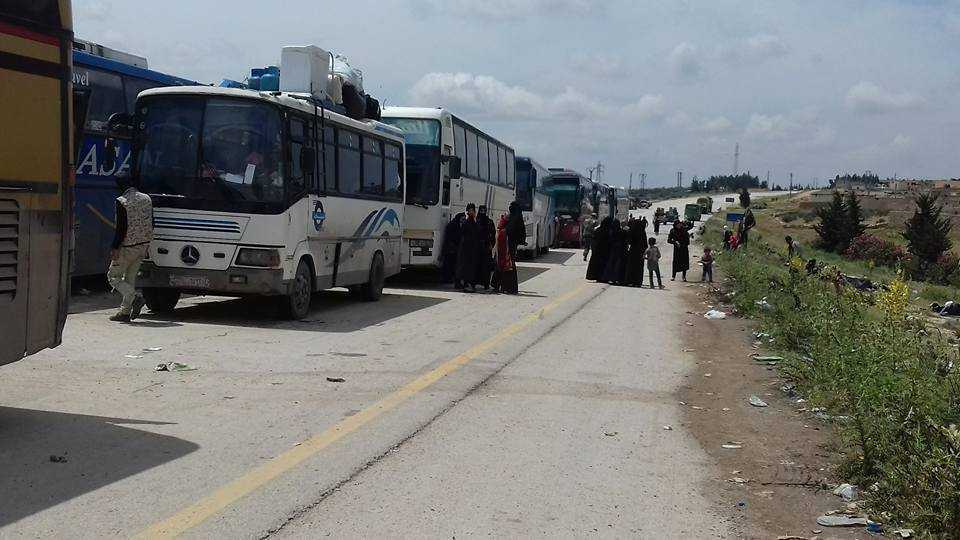Thousands of displaced people from Homs and Damascus ‘stuck’ at crossing to rebel-held northern Aleppo
AMMAN: Thousands of recent evacuees from the north Homs countryside […]
9 May 2018
AMMAN: Thousands of recent evacuees from the north Homs countryside and south Damascus are “stuck” at a crossing between government- and rebel-held areas of Aleppo province on Wednesday as they wait—some now for more than 24 hours—to enter territory held by Turkish-backed opposition forces.
The delay reflects poor coordination between the parties negotiating evacuations and Turkish authorities in Aleppo, a local official with the Syrian Arab Red Crescent (SARC) told Syria Direct on Wednesday, requesting anonymity because he was not authorized to speak on the matter.
Three convoys of buses carrying approximately 8,000 people are now waiting at the a-Zendin crossing near the city of al-Bab, the SARC official said. One of the three convoys was able to enter the rebel-held side of the crossing, he added, but has been prevented from continuing further into Aleppo and remains “stuck.”
Two additional convoys—one from Homs and one from south Damascus—are reportedly en route to al-Bab.

SARC is the primary body coordinating between the evacuees at the a-Zendin crossing and Turkish officials, who maintain a presence in northern Syria after Ankara-backed factions seized territory there from the Islamic State under Operation Euphrates Shield last year.
The evacuees waiting at a-Zendin include residents of the northern Homs countryside and a cluster of towns in the southern districts of Damascus—the latest areas to join a string of recent surrender deals negotiated between rebels and the Syrian government.
However, “there is no coordination” between rebel negotiators and Turkish officials before evacuees arrive in Aleppo, the SARC official told Syria Direct. The lack of communication makes it difficult to secure tents and shelters for the arrivals, he added.
Muhammad Hamdeen, a spokesman for the Turkish-backed coalition al-Jaish al-Watani, also cited poor coordination and “logistical matters” as causes for the delayed entry into rebel-held territory. Those matters “are being addressed right now,” he told Syria Direct from the northern Aleppo city of Azaz.
“We’ve been given no reason why the Turks are prohibiting us from entering,” said Majed al-Masri, 24, an evacuee who arrived at the crossing Tuesday morning after an overnight journey from the south Damascus town of Babila.

“We’re sleeping on the bus seats,” he said. “It’s not the least bit comfortable, but we’re so exhausted that we don’t even feel it.”
Al-Masri says SARC distributed food aid consisting of cans of tuna and jam when they first arrived. “But it’s not enough for the number of people on the buses,” he said.
Medical supplies are similarly limited, Rawad al-Masri, a nurse from south Damascus and the brother of Majed al-Masri, told Syria Direct from the government-held side of a-Zendin on Wednesday.
Pro-opposition media reported that an elderly woman who evacuated north Homs suffered a heart attack on Tuesday and died while waiting at the crossing.
Since then, SARC has taken a handful of cases to medical facilities on the rebel-held side of the crossing for treatment, the nurse said.
Inside rebel-held northern Aleppo, heavy rains on Tuesday flooded existing displacement camps and makeshift shelters holding evacuees who arrived in previous rounds of evacuations.
“Aid organizations can’t keep up with the need,” the SARC official said, “since [evacuees] are arriving in the tens of thousands.”
At least 35,000 people arrived to rebel-held areas of Aleppo province in recent months after evacuating formerly rebel-held East Ghouta and East Qalamoun, according to the opposition-affiliated Assistance Coordination Unit (ACU).







